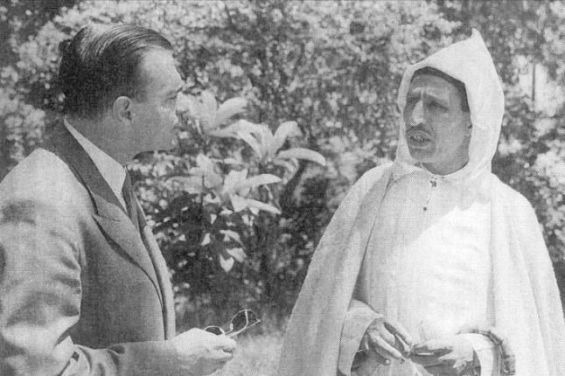In December 1955, King Mohammed V announced the formation of Morocco's first government, after the country broke free from France. A government that did not last for too long : Created on the 7th of December by a royal dahir, this government was reshaped in February 1956 then replaced by another one that ruled the country until the 16th of April, 1958.
On August the 22nd, 1955, representatives from the Moroccan national movement, Moroccan allies of the French protectorate and the government of France, met in Aix-les-Bains for negotiations. They discussed the return of King Mohammed V from exile, which was preceded by the creation of a Throne Council. A return that will be followed by the formation of a coalition government with all the Moroccan parties that took part in the negotiations.
After dethroning Mohamed Ben Arafa, a Council of Conservatives of the Throne was set up on October 15th, 1955. It was tasked with defending the king’s legitimacy while awaiting his return and safeguarding «the permanence and the historic mission of the Sherifian throne», reports an article by Neuchatel's Leaflet.
In addition to Mohamed El Mokri, this council was composed of Mohamed Sbihi, Pasha of Sale, M'Barek Bekkay, former Pasha of Sefrou and Tahar Ouassou Loudiyi.
 Mohamed El Mokri./Ph. DR
Mohamed El Mokri./Ph. DR
After King Mohammed V returned from his exile on November the 16th, the French insisted that M'barek Bekkay be appointed head of the country’s new government. The latter was «presented as an impartial figure» and was one of the representatives invited to the Aix-les-Bains negotiations.
Born on April 18th, 1907 in Berkane, north-eastern Morocco, the man was from the Beni Iznassen tribe. Enrolled in a French school then in the military school of Dar El Beida, he became a second lieutenant in 1928.
In 1942, M'Barek Bekkay became the Caid of Beni Drar then the Pasha of Sefrou in 1944. He is one of the few Pashas who have protested against the deposition of King Mohammed V, leaving office in Sefrou... through a telegram.
A Prime Minister imposed by France
The negotiations began with the return of King Mohammed V. While several political parties confirmed their participation in the new government, the Istiqlal party convened its national congress on December 2, 1955 in Rabat. Politicians from the political party criticized the fact that the country's historic union was not allowed to head the Morocco’s first government. Mohamed Abed Al Jabri recognized in one of his books that it was hard to convince the Istiqlal party and recalled that this mission was entrusted to Abderrahim Bouabid and Mehdi Ben Barka.
«The Executive Committee thought of a possibility : that the other parties could intervene to change the relations that the Party had with the Palace».
On December 7, 1955, a royal dahir announced the formation of the first government in the history of independent Morocco. Consisting of 20 ministerial portfolios and chaired by M'Barek Bakkay, it was however dominated by the Istiqlal party which had managed to land nine ministerial posts. Two Ministers of State Abderrahim Bouabid and Mohamed Cherkaoui, the Ministries of Justice of the Habous, National Education, Public Works, Agriculture, Trade and Industrial Production with a secretariat of State in charge of Information.

The Democratic Independence Party was being granted five ministries and a state secretariat, while the Liberal Democrat Party has won a post.
Overhauled in 1956 and replaced in 1958
This government, which was mainly responsible for negotiating with France and Spain the independence of the country, did not survive for too long. Amid the crisis caused by the Moroccan aircraft baffled by France, the Bekkay I government was overhauled by the decision of the sovereign announced through the Dahir No. 1.56.269 of October 26, 1956.
But the other political parties will join forces against the Istiqlal Party. In October 1957, Mahjoubi Aherdane announced the creation of the People's Movement (MP). Ahmed Réda Guédira and Rachid Mouline will also announce the formation of the «Libres Indépendants», in the form of a political club.

A statement by Abdallah Ibrahim will provoke the ire of the other Moroccan political formations which will announce the birth of the «Front of Defense of the Democratic Freedoms» and present, on April 15, 1958, a petition criticizing the Istiqlal. The nine ministers of the latter will react by presenting collectively their resignation. A government crisis broke out before leading to the appointment, on May 12, 1958, of Ahmed Balafrej, Secretary General of the Istiqlal Party, as Prime Minister and Minister of Foreign Affairs.
The Istiqlal Party experienced its first crisis, with the appearance of two major currents : a conservative and nationalist wing with Allal El Fassi, Ahmed Balafrej or M'hamed Boucetta and another, more progressive, third-worldist and trade unionist with Abderrahim Bouabid, Abdellah Ibrahim and Mehdi Ben Barka as leaders. Almost a year later, on November 6, 1959, a split will lead to the creation of the National Union of Popular Forces.





 chargement...
chargement...













